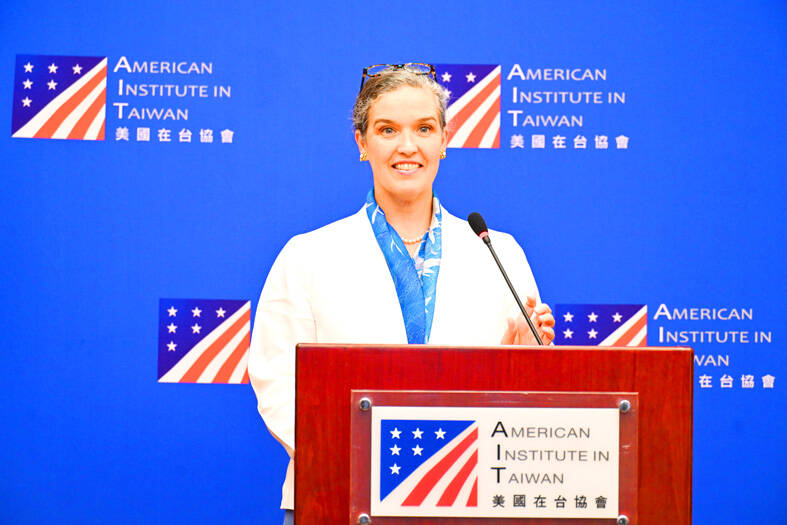The US is “confident” that Taiwan does not face an imminent threat of a Chinese invasion, American Institute in Taiwan (AIT) Director Sandra Oudkirk told a US public radio show, adding that Washington remains committed to defensively arming the nation.
She made the comment during an interview on All Things Considered, broadcast on Friday on US-based National Public Radio.
“There is an important distinction between making plans and training troops, and getting ready to do something,” Oudkirk said, on whether she thinks Beijing plans to attack Taiwan in the near future.

Photo: Tien Yu-hua, Taipei Times
Chinese officials have told Washington that “their preference is for peaceful reunification, and the United States is confident that there is no imminent threat of invasion for Taiwan,” she added.
Last month, US President Joe Biden met Chinese President Xi Jinping (習近平) on the sidelines of the APEC summit in San Francisco, where they discussed the security situation in the Taiwan Strait.
The White House said that Biden called on China to exercise restraint regarding military activity in and around Taiwan, while Reuters reported that Xi demanded that the US stop sending weapons to Taiwan and support Beijing’s plans to annex it.
On whether Washington would halt weapons sales to Taipei at Xi’s request, Oudkirk said that selling Taiwan defensive weapons is part of the US’ long-standing “one China” policy, which has bipartisan support among US lawmakers and remains unchanged.
“Part of that approach to Taiwan is the agreement that the United States will sell defensive weapons to Taiwan, sort of linked to the level of threat that Taiwan faces,” she said. “So that’s a commitment that the United States has made, and that isn’t going to change.”
A recent survey titled, “American Portrait,” conducted by Academia Sinica’s Institute of European and American Studies, showed that only 34 percent of Taiwanese believe the US is a trustworthy country, a drop of 11 percentage points from 2011.
Regarding how the US can counter disinformation and false claims spread online about the US, and people in Taiwan who say that Washington is an unreliable partner, Oudkirk said that the US should be talking more.
“The way to push back against disinformation and sort of deliberate information manipulation is to talk and to engage and to be approachable, and also to work on things like media literacy,” she said.

The CIA has a message for Chinese government officials worried about their place in Chinese President Xi Jinping’s (習近平) government: Come work with us. The agency released two Mandarin-language videos on social media on Thursday inviting disgruntled officials to contact the CIA. The recruitment videos posted on YouTube and X racked up more than 5 million views combined in their first day. The outreach comes as CIA Director John Ratcliffe has vowed to boost the agency’s use of intelligence from human sources and its focus on China, which has recently targeted US officials with its own espionage operations. The videos are “aimed at

STEADFAST FRIEND: The bills encourage increased Taiwan-US engagement and address China’s distortion of UN Resolution 2758 to isolate Taiwan internationally The Presidential Office yesterday thanked the US House of Representatives for unanimously passing two Taiwan-related bills highlighting its solid support for Taiwan’s democracy and global participation, and for deepening bilateral relations. One of the bills, the Taiwan Assurance Implementation Act, requires the US Department of State to periodically review its guidelines for engagement with Taiwan, and report to the US Congress on the guidelines and plans to lift self-imposed limitations on US-Taiwan engagement. The other bill is the Taiwan International Solidarity Act, which clarifies that UN Resolution 2758 does not address the issue of the representation of Taiwan or its people in

SHIFT: Taiwan’s better-than-expected first-quarter GDP and signs of weakness in the US have driven global capital back to emerging markets, the central bank head said The central bank yesterday blamed market speculation for the steep rise in the local currency, and urged exporters and financial institutions to stay calm and stop panic sell-offs to avoid hurting their own profitability. The nation’s top monetary policymaker said that it would step in, if necessary, to maintain order and stability in the foreign exchange market. The remarks came as the NT dollar yesterday closed up NT$0.919 to NT$30.145 against the US dollar in Taipei trading, after rising as high as NT$29.59 in intraday trading. The local currency has surged 5.85 percent against the greenback over the past two sessions, central

‘MISGUIDED EDICT’: Two US representatives warned that Somalia’s passport move could result in severe retaliatory consequences and urged it to reverse its decision Minister of Foreign Affairs Lin Chia-lung (林佳龍) has ordered that a special project be launched to counter China’s “legal warfare” distorting UN Resolution 2758, a foreign affairs official said yesterday. Somalia’s Civil Aviation Authority on Wednesday cited UN Resolution 2758 and Mogadishu’s compliance with the “one China” principle as it banned people from entering or transiting in the African nation using Taiwanese passports or other Taiwanese travel documents. The International Air Transport Association’s system shows that Taiwanese passport holders cannot enter Somalia or transit there. The Ministry of Foreign Affairs (MOFA) protested the move and warned Taiwanese against traveling to Somalia or Somaliland